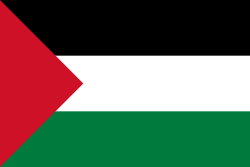
Back حزب طليعة لبنان العربي الاشتراكي Arabic Socialist Arab Lebanon Vanguard Party Hausa Sosyalist Arap Lübnan Öncü Partisi Turkish
Socialist Arab Lebanon Vanguard Party حزب طليعة لبنان العربي الاشتراكي | |
|---|---|
| Leader | Abd al-Majid al-Rafei |
| Founded | 1966 |
| Headquarters | Beirut, Lebanon |
| Ideology | Ba'athism Socialism Secularism Saddamism Anti-Zionism |
| Political position | Right-wing[n 1] |
| International affiliation | Iraqi-led Ba'ath Party |
| Colors | Black, Red, White and Green |
| Parliament of Lebanon | 0 / 128 |
| Party flag | |
 | |
| Part of a series on |
| Ba'athism |
|---|
 |
The Socialist Arab Lebanon Vanguard Party (Arabic: حزب طليعة لبنان العربي الاشتراكي Hizb Al-Taliyeh Lubnan Al-'Arabi Al-Ishtiraki) is a political party in Lebanon. The party was led by Abd al-Majid al-Rafei[3][4] until his death in July 2017. It is the Lebanese regional branch of the Iraqi-led Ba'ath Party. The party held its second congress in October 2011. Founders of the party included Dr. Abd al-Majid al-Rafe'ii, Jihad George Karam, Rafiq Naseeb al-Faqih,Rashid Abo Falah,Karam Mohamed al-Sahili, Hani Mohammad Sho'aib, Ammar Mohammad Shibli, Hassan Khalil Gharib and Wassef El Harakeh.[4] Although formally affiliated to the Sunni-dominated regime in Baghdad, the majority of the party's members were Lebanese Shiites.[5]
The existence of the Lebanese branch of the Iraqi-led Ba'ath Party has much longer roots than its Syrian-led counterpart. Following the 1966 split in the Ba'ath Party between Iraqi and Syrian-dominated factions, the pro-Iraqi party was led by Abd al-Majid Rafei.[6][7]
At first, the pro-Iraqi party and the pro-Syrian party worked side-by-side in the Lebanese National Movement (also known as the National Front), but with tension increasing between them, the two parties were on a war footing.[8] The party was active in 1960s demonstrations,[9] and al-Rafei was detained by Lebanese authorities for his political activities.[10] However, he was a candidate from Tripoli in the 1968 general election.[11] The party expanded during the first half of the 1970s,[12] and in the 1972 general election al-Rafi was elected to parliament from Tripoli.[13] Ali al-Khalil, a former member, was elected from Tyre. The party was active in Southern Lebanon. In Nabatieh it was headed by Hani Mohammad Shoaib. The party was built with generous aid from Iraq.[14]
- ^ Sassoon 2012, p. 30, The rift between the Ba'th parties in Syria and Iraq widened. In February 1966, a military coup by the party's left wing in Syria forced 'Aflaq and the Syrian leadership to seek refuge in Iraq. From that point on, despite short periods of rapprochement, the chasm between the so-called left-wing in Syria and the right-wing supported by al-Bakr and Saddam Hussein was never bridged..
- ^
- Alla, Malumud Ata (1974). Arab Struggle for Economic Independence. Progress. p. 62. Archived from the original on 7 October 2024. Retrieved 1 October 2024.
This struggle sharpened after the Right-wing Baathists seized power in Iraq in 1963 and instituted a reign of terror against the Communists and other progressive forces, which considerably weakened the influence of the Baath Party in all the Arab countries.
- Coughlin, Con (2005). Saddam: His Rise and Fall. Harper Perennial. p. 41. ISBN 0-06-050543-5.
- A. I. Dawisha, (1976). Egypt in the Arab World: The Elements of Foreign Policy. American Political Science Review. Cambridge University Press. p. 56. ISBN 978-0333191958. "Then in July 1968, a coup occurred in Baghdad which brought in the right-wing faction of the Baath party."
- Blamires, Cyprian; Jackson, Paul (2006). World Fascism: A Historical Encyclopedia, Volume 1. ABC-CLIO. p. 82-84. ISBN 978-1576079409.
- Alan John Day, ed. (1983). Political Dissent An International Guide to Dissident, Extra-parliamentary, Guerrilla, and Illegal Political Movements. Gale Research Company. p. 223. ISBN 9780810320505.
- Alla, Malumud Ata (1974). Arab Struggle for Economic Independence. Progress. p. 62. Archived from the original on 7 October 2024. Retrieved 1 October 2024.
- ^ Aḥmad, Aḥmad Yūsuf. al-Ḥarb al-isrāʼīlīya ʻalā Lubnān: at-tadāʻīyāt al-lubnānīya wa-'l-isrāʼīlīya wa-taʼtīrātuhā al-ʻarabīya wa-'l-iqlīmīya wa-'d-duwalīya ; buḥūt wa-munāqašāt an-Nadwa al-Fikrīya allatī naẓẓamahā Markaz Dirāsāt al-Waḥda al-ʻArabīya. Bairūt: Markaz Dirāsāt al-Waḥda al-ʻArabīya, 2006.
- ^ a b Staff writer. جمعية سياسية باسم "حزب طليعة لبنان العربي الاشتراكي" [Political society as the "vanguard party, Arab Socialist Party of Lebanon] (in Arabic). Lebanon Knowledge Development Gateway. Retrieved 18 February 2012.
- ^ El-Khazen, Farid (2000). The Breakdown of the State in Lebanon, 1967–1976. Harvard University Press. ISBN 978-0-674-08105-5.
- ^ Solh, Raghid El-. Lebanon and Arabism. London: I. B. Tauris in association with the Centre for Lebanese Studies, 2004. p. 331
- ^ Rabinovich, Itamar, and Itamar Rabinovich. The War for Lebanon, 1970-1985. Ithaca: Cornell University Press, 1985. p. 79
- ^ Rabinovich, Itamar (1985). The war for Lebanon, 1970–1985. Cornell University Press. p. 79. ISBN 978-0-8014-9313-3.
- ^ El-Khazen, Farid (2000). The Breakdown of the State in Lebanon, 1967–1976. Harvard University Press. p. 143. ISBN 978-0-674-08105-5.
- ^ El-Khazen, Farid (2000). The Breakdown of the State in Lebanon, 1967–1976. Harvard University Press. p. 144. ISBN 978-0-674-08105-5.
- ^ Zumiyya, Jamal (1972). The parliamentary election of Lebanon 1968. Vol. 2. BRILL Archive. p. 106.
- ^ El-Khazen, Farid (2000). The Breakdown of the State in Lebanon, 1967–1976. Harvard University Press. p. 74. ISBN 978-0-674-08105-5.
- ^ Tachau, Frank (1994). Political parties of the Middle East and North Africa. Greenwood Press. p. 307. ISBN 978-0-313-26649-2.
- ^ El-Khazen, Farid (2000). The Breakdown of the State in Lebanon, 1967–1976. Harvard University Press. p. 198. ISBN 978-0-674-08105-5.
Cite error: There are <ref group=n> tags on this page, but the references will not show without a {{reflist|group=n}} template (see the help page).